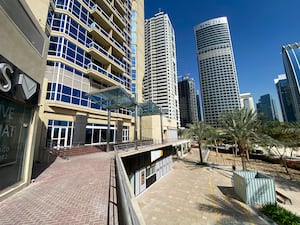A Dubai hostel business has been shut down after its sleep-pod dormitories were found to be in breach of multiple occupancy housing regulations.
The owners of Next House hostels operated six centres in residential buildings in Business Bay, Jumeirah Beach Residence and Dubai Marina.
All have now been closed after complaints from neighbours and a Dubai Municipality investigation that found the business was operating outside tourism licence limitations.
“As the government doesn't have licensing for hostels in residential buildings, we’ve had to close down all our operations," said Rayan Hanna, chief executive and founder of Next House hostels.
“We learnt very quickly you are only allowed to rent the unit as a whole, not per room, not per bed.
“Within six months of operations, the government gave us a call and told us to close the properties.”
The accommodation offered a dormitory and communal living space, a kitchen, an outdoor jacuzzi, pool tables and games consoles.
Each had capacity for up to 26 guests, and a 24-hour check-in option, with a total of 178 beds spread across different city locations. Rates started from Dh60 per night.
Mr Hanna used a holiday home licence to run the business, but was later told this did not apply to hostels, which require their own designated building to operate from, similar to a hotel.
His investment of about Dh1.5 million has been lost, but Mr Hanna is now working with authorities to comply with tourism regulations to resurrect the business.
The issue of multiple occupancy was brought into focus following the recent fire in Tiger Tower in Dubai Marina, that forced the evacuation of more than 3,800 residents.
Some tenants told how they had lived in partitioned apartments close to work to save on accommodation and transport costs.
There is high demand for affordable residency and hostel options are proving popular, particularly given Dubai's tourism sector is booming.
Numerous hostel listings for Dubai and other parts of the UAE are readily available online, with one offering 18 rooms in a two-bedroom apartment.
Next House's website promised a cut-price stay in some of Dubai’s most desirable neighbourhoods, albeit in the limited surroundings of a capsule bed with a privacy curtain in a shared room with several other guests.
However, those living next door to the Business Bay Central Hostel said the revolving door of guests, and constant use of communal lift and building services had become a nuisance.
“I went from having the perfect neighbours to not knowing who was living there one week to the next,” said Mamta Varerkar, who owns an apartment next door with her husband, nanny and young daughter.
“I met the owners, but they never said it was going to operate as a holiday home. I was very surprised and upset.
“The apartment has three bedrooms and they had set up the rooms in such a way that they could allow 26 guest at a time, which is a lot.
“In our building, there are posters everywhere saying the community is for family occupancy only, with no sharing allowed.”
Leila Talibova lives with her husband and two children at Executive Towers, on a floor where one of the hostels was run.
She contacted local authorities to understand the rules around operating hostels.
“When someone rang our doorbell at 10pm asking if our place was the hostel, it was the first we knew about what was happening,” she said.
“When we were looking to buy an apartment, we wanted a building that was family orientated with no sharing allowed.
“We were quite shocked to find a hostel had opened up on our floor.”
To maintain safety and living standards, Dubai Municipality regulates multiple occupancy accommodation with frequent inspections.
Rules state each person must have a minimum area of five square metres of living space, with subletting or shared accommodation without written landlord consent prohibited.
Landlords and tenants found operating overcrowded apartments can be fined Dh10,000 per violation. Next House was not fined as it immediately shut down operations on request.
Overcrowding can create safety hazards, with poor hygiene and ventilation, as well as blocked emergency exits.
Mario Volpi, head of brokerage at Novvi Properties, has 40 years of experience in London and Dubai real estate and said there is good reason for regulations against hostels being allowed to operate in residential buildings.
“A client will come and view the property they’re hoping to buy, to see if it's fit for their requirements," he said.
“But they don't just look at the actual apartment, they're looking at the facilities, the common areas and how the building is being run.
“All these things have a factor on a possible sale, and the value. A hostel would 100 per cent have an effect on the majority of people living nearby.”
Shilpa Mahtani, co-founder and managing director of bnbme holiday homes by Hoteliers, said demand for affordable accommodation is being driven by more younger people travelling to Dubai.
“We expect the short-term rental industry to rise by 18 per cent in 2025.
“This industry has experienced huge growth post-pandemic and we expect this to continue expanding driven by factors like increasing global travel, tech advancements and growing preference for personalised and sustainable experiences.”
About Housecall
Date started: July 2020
Founders: Omar and Humaid Alzaabi
Based: Abu Dhabi
Sector: HealthTech
# of staff: 10
Funding to date: Self-funded
UAE currency: the story behind the money in your pockets
The Limehouse Golem
Director: Juan Carlos Medina
Cast: Olivia Cooke, Bill Nighy, Douglas Booth
Three stars
TOURNAMENT INFO
Women’s World Twenty20 Qualifier
Jul 3- 14, in the Netherlands
The top two teams will qualify to play at the World T20 in the West Indies in November
UAE squad
Humaira Tasneem (captain), Chamani Seneviratne, Subha Srinivasan, Neha Sharma, Kavisha Kumari, Judit Cleetus, Chaya Mughal, Roopa Nagraj, Heena Hotchandani, Namita D’Souza, Ishani Senevirathne, Esha Oza, Nisha Ali, Udeni Kuruppuarachchi
UAE tour of Zimbabwe
All matches in Bulawayo
Friday, Sept 26 – UAE won by 36 runs
Sunday, Sept 28 – Second ODI
Tuesday, Sept 30 – Third ODI
Thursday, Oct 2 – Fourth ODI
Sunday, Oct 5 – First T20I
Monday, Oct 6 – Second T20I
Six large-scale objects on show
- Concrete wall and windows from the now demolished Robin Hood Gardens housing estate in Poplar
- The 17th Century Agra Colonnade, from the bathhouse of the fort of Agra in India
- A stagecloth for The Ballet Russes that is 10m high – the largest Picasso in the world
- Frank Lloyd Wright’s 1930s Kaufmann Office
- A full-scale Frankfurt Kitchen designed by Margarete Schütte-Lihotzky, which transformed kitchen design in the 20th century
- Torrijos Palace dome
Living in...
This article is part of a guide on where to live in the UAE. Our reporters will profile some of the country’s most desirable districts, provide an estimate of rental prices and introduce you to some of the residents who call each area home.
Day 4, Dubai Test: At a glance
Moment of the day Lahiru Gamage appeared to have been hard done by when he had his dismissal of Sami Aslam chalked off for a no-ball. Replays suggested he had not overstepped. No matter. Two balls later, the exact same combination – Gamage the bowler and Kusal Mendis at second slip – combined again to send Aslam back.
Stat of the day Haris Sohail took three wickets for one run in the only over he bowled, to end the Sri Lanka second innings in a hurry. That was as many as he had managed in total in his 10-year, 58-match first-class career to date. It was also the first time a bowler had taken three wickets having bowled just one over in an innings in Tests.
The verdict Just 119 more and with five wickets remaining seems like a perfectly attainable target for Pakistan. Factor in the fact the pitch is worn, is turning prodigiously, and that Sri Lanka’s seam bowlers have also been finding the strip to their liking, it is apparent the task is still a tough one. Still, though, thanks to Asad Shafiq and Sarfraz Ahmed, it is possible.
THE SPECS
Engine: Four-cylinder 2.5-litre
Transmission: Seven-speed auto
Power: 165hp
Torque: 241Nm
Price: Dh99,900 to Dh134,000
On sale: now
More from Rashmee Roshan Lall
THE%20STRANGERS'%20CASE
%3Cp%3E%3Cstrong%3EDirector%3C%2Fstrong%3E%3A%20Brandt%20Andersen%3Cbr%3E%3Cstrong%3EStarring%3A%20%3C%2Fstrong%3EOmar%20Sy%2C%20Jason%20Beghe%2C%20Angeliki%20Papoulia%3Cbr%3E%3Cstrong%3ERating%3A%3C%2Fstrong%3E%204%2F5%3C%2Fp%3E%0A
Kanguva
Director: Siva
Stars: Suriya, Bobby Deol, Disha Patani, Yogi Babu, Redin Kingsley
How much do leading UAE’s UK curriculum schools charge for Year 6?
- Nord Anglia International School (Dubai) – Dh85,032
- Kings School Al Barsha (Dubai) – Dh71,905
- Brighton College Abu Dhabi - Dh68,560
- Jumeirah English Speaking School (Dubai) – Dh59,728
- Gems Wellington International School – Dubai Branch – Dh58,488
- The British School Al Khubairat (Abu Dhabi) - Dh54,170
- Dubai English Speaking School – Dh51,269
*Annual tuition fees covering the 2024/2025 academic year
COMPANY PROFILE
Company name: BorrowMe (BorrowMe.com)
Date started: August 2021
Founder: Nour Sabri
Based: Dubai, UAE
Sector: E-commerce / Marketplace
Size: Two employees
Funding stage: Seed investment
Initial investment: $200,000
Investors: Amr Manaa (director, PwC Middle East)
MATCH INFO
Tottenham 4 (Alli 51', Kane 50', 77'. Aurier 73')
Olympiakos 2 (El-Arabi 06', Semedo')
The specs
Engine: 1.6-litre 4-cyl turbo
Power: 217hp at 5,750rpm
Torque: 300Nm at 1,900rpm
Transmission: eight-speed auto
Price: from Dh130,000
On sale: now
Labour dispute
The insured employee may still file an ILOE claim even if a labour dispute is ongoing post termination, but the insurer may suspend or reject payment, until the courts resolve the dispute, especially if the reason for termination is contested. The outcome of the labour court proceedings can directly affect eligibility.
- Abdullah Ishnaneh, Partner, BSA Law
The National in Davos
We are bringing you the inside story from the World Economic Forum's Annual Meeting in Davos, a gathering of hundreds of world leaders, top executives and billionaires.
MISSION: IMPOSSIBLE – FINAL RECKONING
Director: Christopher McQuarrie
Starring: Tom Cruise, Hayley Atwell, Simon Pegg
Rating: 4/5
Company profile
Name: Thndr
Started: October 2020
Founders: Ahmad Hammouda and Seif Amr
Based: Cairo, Egypt
Sector: FinTech
Initial investment: pre-seed of $800,000
Funding stage: series A; $20 million
Investors: Tiger Global, Beco Capital, Prosus Ventures, Y Combinator, Global Ventures, Abdul Latif Jameel, Endure Capital, 4DX Ventures, Plus VC, Rabacap and MSA Capital
Where to submit a sample
Volunteers of all ages can submit DNA samples at centres across Abu Dhabi, including: Abu Dhabi National Exhibition Centre (Adnec), Biogenix Labs in Masdar City, NMC Royal Hospital in Khalifa City, NMC Royal Medical Centre, Abu Dhabi, NMC Royal Women's Hospital, Bareen International Hospital, Al Towayya in Al Ain, NMC Specialty Hospital, Al Ain
Jetour T1 specs
Engine: 2-litre turbocharged
Power: 254hp
Torque: 390Nm
Price: From Dh126,000
Available: Now
The burning issue
The internal combustion engine is facing a watershed moment – major manufacturer Volvo is to stop producing petroleum-powered vehicles by 2021 and countries in Europe, including the UK, have vowed to ban their sale before 2040. The National takes a look at the story of one of the most successful technologies of the last 100 years and how it has impacted life in the UAE.
Read part four: an affection for classic cars lives on
Read part three: the age of the electric vehicle begins
Read part one: how cars came to the UAE
A timeline of the Historical Dictionary of the Arabic Language
- 2018: Formal work begins
- November 2021: First 17 volumes launched
- November 2022: Additional 19 volumes released
- October 2023: Another 31 volumes released
- November 2024: All 127 volumes completed




